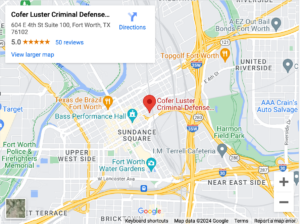
Were you accused of family violence in Texas and unsure what steps to take next? Even a single allegation can threaten a defendant’s freedom, job, housing, and relationships with loved ones. Cofer Luster Criminal Defense Lawyers knows how Texas courts operate and how to build strong defenses against serious accusations, so call (682) 777-3336 for help.
If you’re facing a family violence charge in Texas, don’t hesitate to reach out for help. Contact us today to schedule a free consultation with a Texas family violence lawyer.
Why Hire Cofer Luster Criminal Defense Lawyers if You’re Arrested for Family Violence

Family violence charges in Texas can change your life overnight, and it really matters who you choose to represent you. Cofer Luster Criminal Defense Lawyers stands apart with experience, connections, and credentials hard to find at any one firm.
Here’s why you should choose us:
- We have over 60 years of combined experience in criminal defense.
- Our defense team includes Board Certified attorneys (Texas Board of Legal Specialization), former prosecutors, a former magistrate judge, a law professor, and a former federal public defender. This gives us unique insight into how the system works from all sides.
- We regularly collaborate with leading experts in fields like psychology, forensics, and law enforcement tactics to challenge questionable evidence and strengthen your defense.
- We provide the highest quality representation for clients facing both state and federal criminal charges. No matter how complex your case is, we can help.
Being accused of such a serious crime in Texas is frightening and confusing, but when you rely on Cofer Luster Criminal Defense Lawyers, you have hope of successfully fighting the charges. Contact us today to schedule a free consultation with a Texas criminal defense attorney.
Overview of Family Violence in Texas
Texas law defines family violence broadly under Texas Family Code § 71.004. It isn’t limited to physical injuries; it also covers threats that put someone in immediate fear of harm, as well as acts of sexual abuse.
Family violence is not restricted to people related by blood: the law recognizes it between those who are married, divorced, living together (current or ex-roommates), related by adoption or through extended family, or between people who are or were dating.
You may face the following family violence charges in Texas:
Domestic Assault
In Texas, domestic assault means causing or threatening bodily injury to a family member, household member, or someone you’re dating. Physical harm isn’t required for a conviction.
Aggravated Domestic Assault
Aggravated domestic assault is a more serious charge, reserved for situations where serious bodily injury is caused to a family, household, or dating partner. It can also be charged when a deadly weapon (like a gun, knife, or any object that can cause death or serious harm) is used or displayed during the incident.
Even just brandishing a weapon during a threat can turn a regular assault into an aggravated one.
Continuous Violence Against the Family
A charge of continuous violence against the family applies when someone commits two or more domestic assaults within 1 year, even if they never resulted in a conviction or even the person being arrested.
If you’re accused or investigated for any of these, seek experienced legal help immediately.
What Are the Penalties for Family Violence in Texas?
Facing a family violence charge in Texas is a serious legal matter, and the potential penalties can be incredibly disruptive to all aspects of your life. Your exact consequences will depend on the specifics of your case and whether prosecutors classify it as a misdemeanor or a felony offense.
Misdemeanor Family Violence
For a first offense that does not involve aggravating circumstances, the charge is typically a Class A misdemeanor. This can lead to up to 1 year in county jail and a fine up to $4,000. In some cases, a judge may allow for community supervision (probation) instead of jail time.
Felony Family Violence
Certain factors automatically increase the seriousness of a family violence charge to a felony.
- Previous domestic violence convictions: If you have a past domestic violence conviction, any new charge will almost always be prosecuted as a third-degree felony.
- Strangulation: Intentional actions that allegedly restrict a family member’s breathing (such as putting hands on someone’s throat) can result in a third-degree felony, and depending on the circumstances, it could be increased to a second-degree felony.
Punishment for a third-degree felony usually means 2 to 10 years in prison and up to a $10,000 fine. For a second-degree felony, the possible prison term is 2 to 20 years, with the same possible fine.
Additional Charges and Enhancements
In certain cases, aggravating factors will lead to additional charges and/or sentencing enhancements:
- Continuous family violence: If the accused is charged with committing family violence on two or more occasions within one year, it will be charged as a third-degree felony, which carries 2 to 10 years in prison and up to a $10,000 fine.
- Serious bodily injury: If an assault results in serious bodily injury, it will be charged as aggravated assault, which is generally treated as a second-degree felony. Penalties include 2 to 20 years and up to $10,000 in fines.
- Deadly weapon: When a deadly weapon is involved in an incident against a family member, the case can be prosecuted as a first or second-degree felony. Possible sentences include up to life in prison. A deadly weapon finding during sentencing usually requires the defendant to serve at least half of the imposed sentence before becoming eligible for parole.
If you’re facing allegations of family violence, it’s crucial to understand the full range of potential penalties. The best thing you can do is to talk to a criminal defense lawyer right away.
What Defenses Can Be Raised if I’m Arrested for Family Violence?
Being arrested for family violence in Texas can feel overwhelming, but you’re not powerless – good legal defenses can make all the difference. Your attorney will carefully analyze every part of the case to best protect your freedom and your reputation. Here are some possible options:
Lack of Evidence
If police and prosecutors don’t have enough proof, like clear eyewitnesses, credible injuries, or reliable statements, this is a good argument that you shouldn’t be convicted. Inconsistencies or a lack of actual harm can raise enough reasonable doubt to clear your name. You Acted in
Self-Defense
The police arrest whoever they believe is the perpetrator, and this is often the person who seems to have caused more physical harm to the other party. However, this can occur if you were just trying to protect yourself.
If you used force on someone to prevent injury to yourself or someone else, your lawyer can show the court how your actions were justified under Texas self-defense laws.
False Claims or Exaggeration
Personal disputes, breakups, or custody fights can sometimes lead to false accusations of family violence. If your lawyer finds motive, hidden agendas, or holes in the accuser’s story, they can argue the incident was made up or exaggerated for leverage.
No Qualifying Relationship
Family violence laws only apply to certain relationships, like those between parents, former partners, roommates, or family members. If the accuser doesn’t fall into one of those categories, you shouldn’t be facing family violence charges.
Working with a qualified lawyer gives you the best chance of walking away without a conviction.
Schedule a Free Case Evaluation With Our Texas Family Violence Attorney
Facing a Texas family violence charge is never simple. Without the right legal support, you could face tough penalties, long-lasting protective orders, and a criminal record that follows you forever. At Cofer Luster Criminal Defense Lawyers, we’ve handled all types of family violence cases and know the strategies that actually work, both in and out of court.
We understand what’s truly at stake – not just today, but for years to come. Contact us today to schedule a free consultation with a Texas family violence lawyer.

